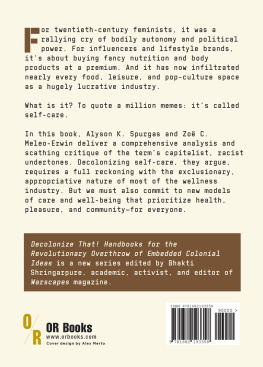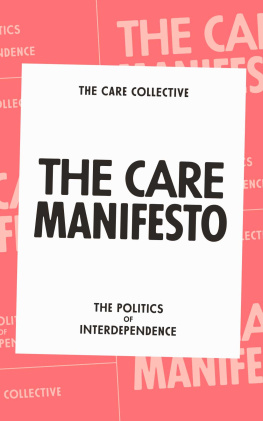


Forthcoming in the Decolonize That! series
Decolonize Multiculturalism by Anthony C. Alessandrini
Decolonize Drag by Kareem Khubchandani

The Decolonize That! series is produced by OR Books in collaboration with Warscapes magazine.
2023 Alyson K. Spurgas and Zo C. Meleo-Erwin
Published by OR Books, New York and London
Visit our website at www.orbooks.com
All rights information:
All rights reserved. No part of this book may be reproduced or transmitted in any form or by any means, electronic or mechanical, including photocopy, recording, or any information storage retrieval system, without permission in writing from the publisher, except brief passages for review purposes.
First printing 2023
Cataloging-in-Publication data is available from the Library of Congress.
A catalog record for this book is available from the British Library.
Typeset by Lapiz Digital Services. Printed by BookMobile, USA, and CPI, UK.
paperback ISBN 978-1-68219-335-8 ebook ISBN 978-1-68219-336-5
CONTENTS
EDITORS PREFACE
Weve all gone down that virtual rabbit hole: scrolling and scrolling, eyes and thumb glued to the phone. And because your social media knows you so well, youre sure to find it: that perfectly articulated and instantly empowering meme-quote.
It will most likely be some version of Snoop Doggs heavily lip-synced viral song, I Wanna Thank Me, where he not only thanks himself for believing in himself but also reminds himself of his own upright and charitable personality. Unfortunately, your meme-quote will lack Snoops humor as well as his allusion to his years of hard work, but it will still be the thing you need right there, right now.
Youll find this meme-quote around the time youre feeling unappreciated at work, despairing from not losing weight on your new diet, and seeing a spike in casual sexism all around you (cos youre probably a cis woman). The meme-quote will tell you that you matter, that you deserve happiness, that you are manifesting a resilient, purposeful, and empowered you. You are the boss of you. Urgently, it will tell you that self-care is the thing you need right now. At least momentarily, you will be convinced by these truths. Even if youre a cynic or an anti-capitalist rebel, youll probably find the peppy meme harmless enough that you might follow a bunch of self-care accounts, subscribe to a new exercise program or a meditation app. Maybe you will even splurge on one of those constantly advertised feminist bras: the ones that support your boobs and the revolution.
In Decolonize Self-Care, Alyson K. Spurgas and Zo Meleo-Erwin offer an accurate diagnosis of all of the above: People today are overworked, exhausted, worn down, and many (hello!) are full of rageas we should be! Care is something so many of us desperately need. And nothing like a dangerous, global pandemic to remind us just how much we need this. As I write this on a random Tuesday morning, the hashtag selfcare has been used in 57.8 million posts on Instagram. It would be a cop-out to simply say that social media turns us into fools, and it behooves us to view this fury of posts as a cry for help from people who hope to improve their lives. Yet these social media posts offering quick fixes are not the solution, and these empty signifiers show us that something is irreparably broken in existing systems for care and wellness.
In their thoughtful and considerate book, Alyson and Zo are not only cognizant of our collective despair, but are trying to figure out why none of this is working. Why is there so much self-care all around us, but so little good health, relief, or peace? Decolonize Self-Care exposes this extractive, capitalist racket by showing, for starters, that contemporary self-care industries are deeply out of touch with the types of care that many people actually require and are clamoring for. Self-care is an integral ingredient in everything from brands by mega-influencers Gwyneth Paltrow and Kim Kardashian; to the promotion of Girl Bosses, FemTech divas, and women entrepreneurs; to the proliferation of painmoons and extreme travel; to several diets using dog-whistle terms like clean, ancient, or paleolithic; to mindfulness programs that optimize womens inherent productivity, mindful eating, mindful breathing, and mindful sexuality. Self-care is also a component of that most elusive of products on the market today: the female orgasm.
Self-care has been on a pretty twisted journey since Audre Lorde first crafted the idea almost thirty-five years ago. Caring for myself is not self-indulgence, it is self-preservation, and that is an act of political warfare, declared this Black, lesbian, socialist feminist at a time when she was coping with breast cancer. As the authors of this book make clear, what we seem to have really stuck with today is the self part. The political warfare bit, the part that insists on self-care as community care, and what they call the revolutionary movements that connected care, health, and wellness to broader efforts for change, have been largely lost in the crude neoliberal hustle to make a quick buck (or maybe a quick million) primarily from capitalizing on peoples poor physical and mental health. There is abundant irony here too: the same hustle that demands you work overtime and causes you extraordinary stress can be alleviated by the self-care hustle.
Self-cares inherent neoliberalism and its profitfacing, get-rich-from-peoples-despair tendency may not need much unpacking, but its connections to colonization and decolonization are often not immediately visible. Yet the math is simple: the Lorde version of self-care was decolonial at its core but today, in becoming an industry preying upon women and queer populations, it has literally sold its soul. Decolonizing, dismantling, and resisting self-care is more urgent than it appears.
Colonial ideology relies heavily on a system of binaries: civilized/uncivilized, master/slave, masculine/feminine, and normative/queer. Marxist feminist scholar Maria Mies explains it best: The predatory patriarchal division of labor is based, from the outset, on a structural separation and subordination of human beings: men are separated from women, whom they have subordinated, their own people are separated from the foreigners or heathens. This system forms the hidden foundation of colonial society. These binaries remain entrenched in our collective consciousness to this day and manifest themselves whether at home, at work, or unfortunately, in your own sense of self. The three interconnected Cs (colonialism, capitalism, christianity) that have wrecked two-thirds of the planet created this foundation by violently controlling and subordinating their own and other women and actively erasing other genders.
European men kept European women subjugated through a rigorous network of economic, religious, civil, and psychological institutions. Let me remind you of Lie back and think of England. A phrase that allegedly originated in Victorian times speaks volumes about making heterosexual intercourse tolerable for women by reminding women of their duty to produce sons for a rapidly expanding Empire. These same white/Western women produced the next rung of domination by tyrannizing native, enslaved, or colonized women in colonial outposts and in settler colonies. In these gendered spaces, control was often exercised through direct violence, but not always. Civilizing other women through the enforcement of hygiene, wellness, diet, dressing, medicine, and behavior was an important part of European womens pious and feminine colonial agenda.
Next page











